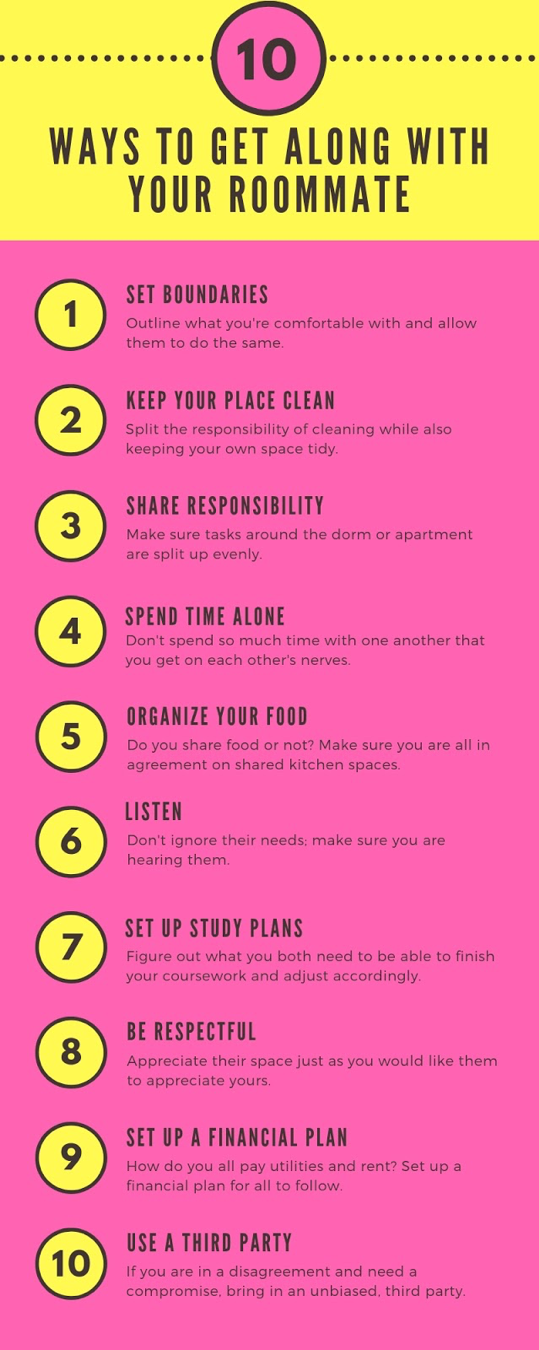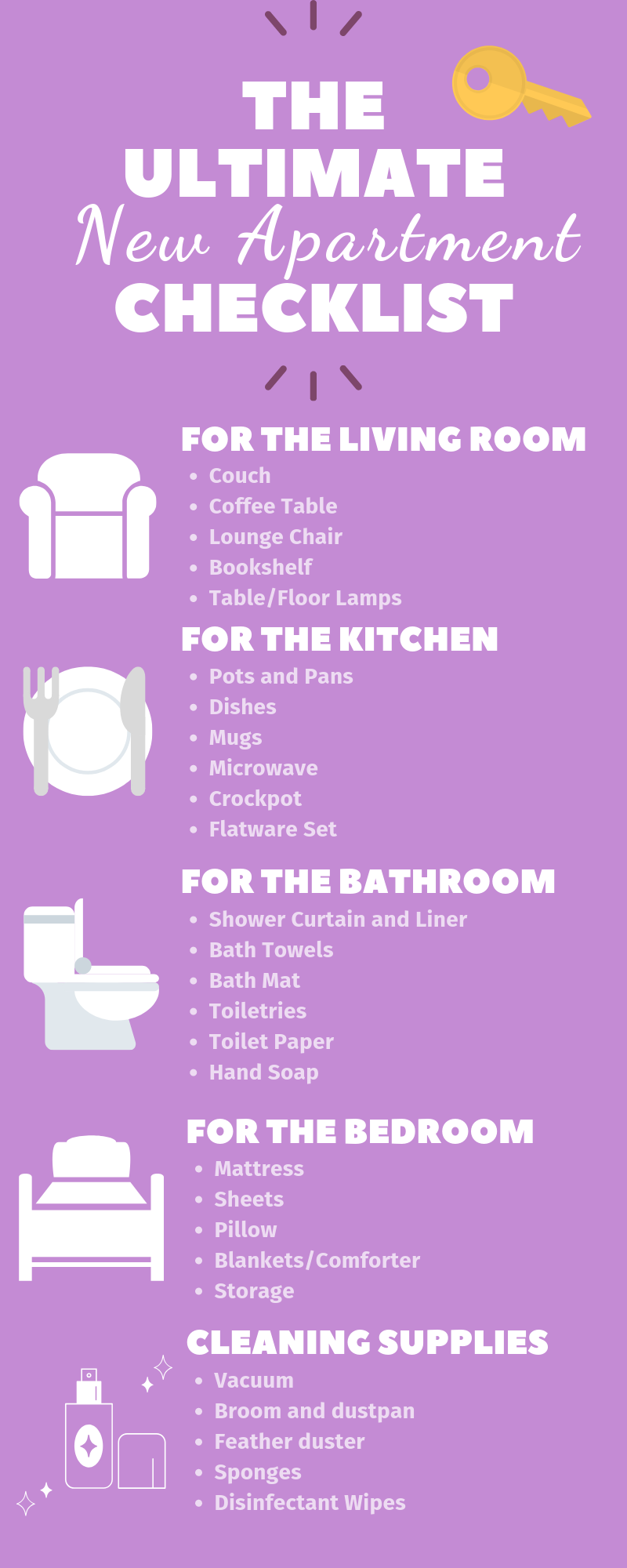College Roommate Tips
4 Overlooked Tips for Living with a Roommate
When it comes to living with a new roommate, there are always so many factors to consider in your relationship: each other’s sleep schedules, whose side of the room each of you gets when either of you gets to have friends over … the list can go on and on. Maybe you’re familiar with some of the typical advice surrounding roommates (e.g., don’t leave passive-aggressive Post-It notes around the room), but there are bound to be some tips you’ve overlooked before.

1. Make a chore chart.
One piece of advice you’ve probably heard a million times is to remember to do your chores while in college -- things like do your laundry, vacuum, make your bed, etc. When you have a roommate, doing chores could get a little bit trickier, especially if you have multiple shared spaces such as a common area or a kitchen.
To figure out how to divide up your responsibilities with your roommate, create a chore chart. The chart could be any shape, size, or format -- as long as it’s organized and kept in an easily accessible place where both you and your roommate can check it regularly. Investing in a whiteboard or chalkboard could be useful if you want to draw a chart and easily erase and replace certain chores with new ones each week. Or you could create a fun circle chart that allows you to spin the wheel or arrow to decide who has what responsibilities for the week.
2. Pick up after yourself … everywhere.
Depending on what your living accommodations are, there could be multiple places where you might possibly leave a mess. Even if it’s not your turn to complete a certain chore, you should still be obliged to pick up after yourself if you happen to leave behind a small mess.
Your shared room is definitely one place where this rule applies. Be mindful of keeping your stuff on your side of the room, as you don’t want to infringe on your roommate’s space. Also, try your best to pick things up off the floor -- nobody wants to come home to a cluttered floor, and besides, having too many things lying around could be hazardous.
The bathroom is another area where you should pick up after yourself. If you happen to have long hair (and consequently shed a lot whenever you’re showering or brushing your hair), make sure to pick up your hair from the bathroom floor and even from the shower drain.
If you and your roommate share a common room and a kitchen, make sure those areas are kept clean as well. If you’re cooking in the kitchen, remember not to leave your food all over the counter or your dirty dishes in the sink for too long. A huge part of being a good roommate is being courteous and respectful of the other person’s space.
3. Learn how to deal with silences.
When you first meet your new roommate, you might be expecting to get to talk to them all the time, nonstop. And sure, maybe that’s how it will be sometimes, but there will also inevitably be silences between the two of you -- and that’s perfectly normal. It’s important that you both learn to be comfortable with these silences when you’re in the room together. Doing so allows you to give each other some much-needed, non-awkward space, perhaps at the end of a long day.
In that same vein, don’t try to force a friendship. You may have had the idea of becoming automatic best friends with your roommate, but the truth is, you can’t force these things or speed up the process of becoming friends. Instead, give each other time to warm up to one another so that neither of you feels pressured to become the best of friends right away.
4. Respect their finances.
If you’re living in an apartment and splitting the rent with your roommate, it’s important that you handle your own money responsibly and that you respect your roommate’s finances as well. Essentially, that means paying your rent on time. If there are other expenses that need to be paid in addition to rent, it may be helpful for the two of you to sit down and have an honest, open talk about what you expect from each other financially. Having a plan in place will provide security in case something unexpected comes up.
Living with a roommate can often be a fun, joyful, and memorable experience. Make the effort to be friendly and agreeable, and you’re sure to enjoy living with someone new.
Starting Off Right: How to Get Along with Your Roommate All Year
 When it comes to getting along with your roommate, the inevitable is true: you will have a disagreement with them at some point during the school year.
When it comes to getting along with your roommate, the inevitable is true: you will have a disagreement with them at some point during the school year.
For some, this is expected. For others, this comes as a shock. The truth is, when you move two people that don’t know each other well into the same room for an entire year, problems are likely to ensue, it’s just to what level.
Whether it’s an argument over an electric bill, a tiff over control of the TV or a situation in which one roommate feels smothered, these are all common occurrences that you can plan for and get ahead of, before they even happen.
So, in an effort to help you combat this issue and ensure you and your roommate get along all year through, here are ten methods to help you get along with your roommate all year.

1. Set Boundaries
First and foremost, it’s important that you immediately set boundaries with your new roommate. There are likely some things that you won’t put up with, as there are likely things on the other end that they won’t put up with.
Starting a conversation surrounding boundaries and what you feel is and isn’t acceptable will ensure that the two of you are working together and understand one another’s needs.
Without this initial conversation, arguments are likely to ensue. Remember that just because something is acceptable to you does not mean it’s acceptable to the other person and vice versa. Keep in mind there may be cultural differences, philosophical differences or simply differences of opinion as it relates to everyday occurrences.
So, before the issues begin, make sure that you set boundaries with the individual you’re going to be living with.
2. Keep Your Place Clean
The second most common reason for arguments with a roommate is cleanliness. Often, you’ll have two types of people: one that’s clean, and one that isn’t. And, more often than not, the two individuals will have clashing opinions on this topic.
As far as cleanliness is concerned, the answer is simple: keep your place clean. As far as methods go, make sure you outline those with your roommate upon moving in.
For instance, should you both be responsible for your own side of the room? Should you switch off responsibilities such as dusting and vacuuming? How often do you want to clean? Should you work together to clean once a week? If so, is there a specific day that works best for both of you that you should set aside? Who is responsible for cleaning when guests are going to stay?
While the idea of keeping your place clean can be a simple one, the methods behind it are not so simple. For this reason, speak with your roommate to answer these questions, determining the best method for both of you to move forward with.
Obviously, there will be some times in which you need to assess the situation on a case by case basis. However, outlining your cleaning initiatives before you even move in is the best way to ensure arguments are kept at a minimum.
3. Share Responsibility
In building upon the above example, it’s important that you and your roommate are sharing responsibility around the apartment or dorm room.
While cleaning is one of these elements that you should be concerned about, you should also think about other situations in which you and your roommate should be sharing responsibility. For instance, when thinking about cooking, are you both going to cook your own meals? Will you share meals and one person will cook them and you’ll switch off?
Outside of that, who is responsible for certain bills, or will you split all of those evenly? What is the likelihood that all roommates can be trusted to pay the bills on time? Is there an easier way to set up your billing?
Again, there are plenty of areas in which you can share responsibility with one another, it’s just a matter of having these conversations and setting up your process prior to any arguments.
4. Spend Time Alone
One of the biggest faux pas of a roommate relationship is wanting to spend a lot of time with your roommate. While this is entirely normal and expected, it can also become overwhelming and you can become annoyed with one another much more easily.
Basically, when you’re in close proximity to someone all the time, it starts to wear on both of you. For this reason, make sure that you are spending time alone as well (or with other friends).
When you get wrapped up in your roommate, it’s a good thing, but can play out negatively as well. This is why it’s important that you balance out your experiences with your roommate and ensure that you spend time together, but that you also spend enough time alone to make up for that.
5. Organize Your Food
Staying organized is never an easy task (unless you’re a bit of a neat freak, like me). However, when it comes to certain shared spaces, it’s important that you are always organized.
For instance, in regards to food, you’ll want to organize this in advance so you and your roommate get along much more easily. For instance, do you share food? If not, how will you separate it to ensure the other roommates don’t accidentally take your food?
Are there shared pots and pans? If so, who is responsible for washing them? Are there any kitchen items that aren’t shared amongst the roommates? What’s up for grabs versus what isn’t? How are you going to let everyone know?
Some roommates opt to share the kitchen space, meaning they take turns cooking for one another and share their groceries. Others buy and cook for themselves.
While either method can work, it's important that you set up those boundaries in advance, as arguments over stolen food and someone not cooking when they’re supposed to, or not washing a pot/pan in time, are not far behind if you don’t.
 6. Listen
6. Listen
Obviously, one of the most important things you can do when living with another person is to listen to them. What are their concerns? Is there anything that you can do to ease the living situation? What about the other way around?
Communication is key when it comes to living with another individual, which is why listening is so important in these situations. What are their needs? What are your needs? How can the two of you meet in the middle?
Is your roommate complaining about something repeatedly? If so, what are you doing to warrant these complaints?
On rare occasions, you will end up living with someone that you just aren’t compatible with. However, more often, roommates don’t get along because they don’t listen to and communicate with one another.
So, prior to going through awkward and painful conversations about switching roommates, try to communicate with one another and make sure you’re listening to one another’s needs.
7. Set Up Study Plans
Another common argument that roommates tend to have relates to studying. For most, the argument is surrounding the amount of noise in the apartment or dorm. For instance, if your roommate is watching TV and you’re trying to study, this could create an issue.
Or perhaps your roommate listens to music while they study but you can’t think when music is playing nearby.
Basically, the question becomes: how can the two of you coordinate your study times and habits to ensure everyone is happy.
For one, you’ll likely want to set up rules. For instance, if a roommate is watching TV, they’d like to do so on their television that they pay for. So if you need to study, you should either go into a separate room or, if that isn’t an option, visit the campus library or a classroom.
Conversely, if your roommate needs music to study and you don’t, they should put in headphones to accommodate your needs.
While these seem like petty arguments, they can turn into huge conflict, so it’s best to set up a solid plan regarding your study habits before you even need to have the argument. That way, everyone is happy and the terms are entirely fair.
8. Be Respectful
Living with a roommate isn’t easy, but you should always be respectful throughout your living situation.
While tensions can sometimes get high, you should always attempt to keep a level head, avoid saying things you don’t mean and, in situations where it’s necessary, walk away and only come back once you’ve cooled down.
There are lots of pain points in a living situation, so avoid these tense situations by being respectful at all times, and you’ll likely get the same treatment right back, ensuring there are minimal arguments between you and your roommate.
9. Set Up a Financial Plan
While it took a little while to get to this point, it’s a very important one. Financial arguments are a huge concern when living with another individual. For instance, who is going to set up the bills (such as water, gas and electric)? Are you going to split these down the middle? Does everyone want cable? If not, how do you plan on splitting that bill?
What is the process for paying your rent? Do you all need to combine finances or does your rental office allow you to pay your parts separately?
Essentially, when worrying about finances in a living situation, arguments are just around the corner. For this reason, get ahead of the arguments by setting up your payment plans well in advance, ensuring everyone is accountable for their own bills.
In addition, you’ll want to ensure you are both on the same page as far as heating and air conditioning. There are plenty of thermostat arguments to be had, so make sure you come up with a compromise that fits both of your needs before it escalates into a large issue.
10. Use a Third Party
Last, but definitely not least, when you are living with another person, there are bound to be arguments in which you don’t agree with one another at all. Rather than allowing an argument to escalate to this point, you should pull in a third party to give you an unbiased opinion.
While the need for this third party is likely to be slim, every once in a while, you may benefit from bringing in a third party to help you settle a disagreement, or even to set up a compromise that’s entirely unbiased.
You’ll want to choose someone that’s completely unbiased, so they can’t be closer with one of the two of you, and you’ll also want to ensure they have a full picture of your situation prior to making their judgment.
Again, living with a roommate that you just met (or even those that you have known for some time) is likely to turn into an argument at some point, whether you’re prepared for it or not. Whether big or small, these arguments can be detrimental to a relationship, which is why it’s so important to get ahead of them before they even begin.
So, in an effort to combat this issue ahead of time, take the above ten steps upon moving in with your roommate (and throughout the rest of the year) to get ahead of any larger, potential problems that may be lurking down the road.
While this isn’t an exhaustive list, this is a good place to begin your partnership for the next year, as it not only shows that you want the relationship to work, but it also allows your roommate to voice any concerns they may have, ensuring everything is discussed in advance, before it becomes a problem.
There are countless items that you can discuss with your new roommate, but as far as starting off right is concerned, the above ten steps are the best way to get along with your roommate all year long.
What To Look For In A Roommate
Finding a great roommate can sometimes seem like an impossible task. You’re looking for someone that you’ll be sharing your space with for likely an entire year. Of course, you know what you want in an ideal person, but what really matters when it comes to looking for a roommate?

1. Compatibility in living styles
There is no one perfect roommate for everyone. Because everyone has a different living style, the right roommate for you will largely depend on how you live. It is of the utmost importance that you and your roommate figure out what your style of living is and whether or not they will work well together.
Ideally, a great roommate will have almost the exact same living style as you. You may be tempted to live with someone with a completely different way of living, but usually this ends up in annoyance, and further down the line, conflict. The best way to avoid those scenarios are to choose a person that lives in a similar way.
Think about what a typical weeknight or weekend might look for you. Are you someone who likes to stay in most of the time? Do you prefer things to be quiet or do you like playing music and TV shows out loud? Do you enjoy having friends over all the time or would you rather meet them somewhere else? Are you an early riser or do you stay out late? All of these questions will lead you to your living style. It may seem like common sense, but if you like to enjoy the quiet and relax in the evenings, you aren’t going to want to live with someone who likes to invite people over and play loud music.
Another big concern about living style is cleanliness. Most arguments that happen between roommates occur because of differences in how clean the apartment should be. Have an honest and frank discussion with a potential roommate. Ask things like, “How do you feel about clutter?” and “How long would you let dishes sit in the sink before cleaning them?” This will help you gauge what kind of mess each of you thinks is normal. If you have similar opinions on what needs to be cleaned and when, then you’ve likely found a great potential roommate. If you have quite a few differences, then you may want to find someone else.
2. How they handle conflict
Even though this process of finding a good roommate means cutting down on potential conflict, there will still inevitably be an argument about something. Knowing how this person argues is essential to understanding how they will act when something may go wrong. You should also think about how you react when conflict happens. Some questions to ask and think about may be: Are you confrontational or do you avoid problems? How do you handle issues that occur between friends?
When it comes to someone being your roommate, you aren’t necessarily looking for a person that handles conflict in the exact same way that you do. However, you may already know that you don’t like handling things in a certain way, and if that person does, then it might become a bigger issue in the end. For example, if you know that you don’t like loud, confrontational people then you should avoid roommates that react in this way.
3. How responsible they are
This one can also be difficult to gauge, especially if you don’t know a person very well. It can also be kind of awkward because it can often bring up topics like money and savings. However, regardless of how difficult this conversation may be, it is very important to know this information before signing a lease with someone. Choosing someone that is irresponsible with money means that there will be lots of roommate conflicts down the line.
Firstly, a potential roommate shouldn’t have problems with deadlines. If they consistently find themselves forgetting to pay rent in the past, then it is likely to continue and will then become your issue too. You don’t want to be stuck having to cover their half of the rent or chasing them all the time to pay you back. If they’ve never had to pay rent before, maybe ask about how they are in school with turning things in on time. This is often another good indicator of how responsible they are.
As always, remember that nobody is perfect and neither are you! Finding a great roommate doesn’t mean finding a perfect person, it just means finding someone that you will be comfortable and happy living with. It is totally fine if there are some things you can compromise on and others that you care deeply about. Trying to find the right roommate isn’t a strict process, so remember to always trust your instincts.
Combining Your Roommate's Style With Your Own
When you move out for the first time, you will soon realize that living on your own is very expensive. One of the quickest ways to cut living expenses is to add at least one roommate so that the amount of money you pay is cut by half. There is plenty that can go right with having a roommate: less expensive rent, an extra person to keep watch over the apartment when you are gone, and good company. There is also plenty that can go wrong, like clashing personalities or living styles. Lucky for you, there are also steps you can take to minimize the amount of clashing that takes place between one of your roommates.
Conflict can often break out when it comes to decorating your living space when you and your roommates have different styles. Instead of letting the issue create a rift between you and your roommate, try some out some of the following tips to help you and your roommate out when combining your roommate's style with your own.

Discuss your "must-haves"
When you have a different style than your roommate and you need to start combining your roommate's style with your own, it is easier to view it as a negotiation. Just like any negotiation, start it out by defining what each roommate really wants (and really doesn't want) at the end of the process. It is a bit more complicated when it comes to decorating your living space, as each person's "must-haves" can be the things that clash the most when it comes to style. Despite their name, "must-haves" do not necessarily have to be things that have to end up in your shared space, but can act as great starting parts when it comes to combining your roommate's style with your own.
For example, one roommate may like an extremely bright space with lights in every corner and everything with light colors to make space look a lot brighter than it actually is. However, you may like a more dim approach to make your living space look more cozy and comfortable. Those are two very opposing styles, but rather than rule one out in favor of the other, combine them. Rather than putting lights everywhere or holding back the lighting, try finding a middle ground where both of you are happy. Different sources of light and various ways of controlling natural light can be plenty of help. Instead of putting lamps everywhere and getting sheer curtains to let as much natural light in as possible, try getting lighting options that offer different levels of light. Light bulbs with dimming options or yellow versus white light can help control how bright a room can get and help both of you feel comfortable in your space.
Break up space for individual style
Sometimes styles will clash and rather than stopping the clashing of styles, embrace them by placing each style in your living style. Break down the living space that you are working with each space as something you can work on as an individual space. If you are working on decorating your room, designate parts of the space to each person. Try grouping each person's belongings, like one half of the room holds your bed, desk, and other belongings and the other half holds your roommate's belongings. Each person should be able to decorate their half as they please.
Think of them as two separate rooms, if it is harder for you to do so visually, try physically breaking up space. Get a room divider or two to make clear divides between the different sides of the room and styles. Or, instead of a room divider, choose a piece of furniture that you both can use to make the "room divider" more functional. Try out a bookcase - it can serve as the place marker where you and your roommate's sides meet, and also serve as a place where you can store belongings and decor.
Start small when combing styles
Shared spaces like living rooms, dining rooms, kitchens, and bathrooms are going to be harder as they are the rooms where everyone has an equal right to the space. Rather than going all-in on one person's style like you may have done with individual sides of a shared room, try placing touches of each person's style into shared spaces to make each person feel like their style is represented in the shared spaces.
There are various ways to incorporate different styles in small ways: decorate pillows, rugs, potted plants, tapestries, art prints, and so much more. These "small touches" can contribute to the living space looking a lot more lived-in and cozy. Combining multiple styles does not have to have visually clashing decor when you limit representative styles to smaller touches throughout a shared space.
Combining your roommate's style with your own does not have to result with you being unhappy in your space. As long as you put effort into making sure each person feels represented in your living space, you both can enjoy a space that reflects the both of you and makes you feel comfortable to call home.
Fun Activities To Do With Your Roommate This Semester
A new semester is here. Whether this means getting a new roommate or being with the same roommate as before, there are a ton of activities this semester that you can do together on campus. These can help you get to know your new roommate or bond even more with a roommate you had before.

Go to an athletic event
For some colleges, football is life. For others, they may be more known for sports such as baseball or hockey. Either way, going to a sporting event with your roommate is a great way to relax while bonding. Even if you are not a big fan of the sport, or of sports in general, your roommate may be. It is also fun cheering your school on against the competitor.
Catch a movie
Some colleges have their own theaters where they play previously released movies at discounted prices. Even if your college does not have this, you can find a nearby movie theater to see a movie at. Make a night of it and grab dinner before or after the movie. Find a movie that you both want to see, or make it a monthly outing and alternate who chooses the movie so that you each get a chance to pick.
Plan a fun night in
Pick a day each week that you can have a night in to spend with your roommate. Whether you have a spa night or just have some wine and watch a movie, staying in can help you bond closer while saving money. You can also invite friends so that your friends can meet your roommate and their friends to help you get even closer.
Attend a campus lecture
If there is a lecture outside of class time, see if your roommate wants to go with you, especially if it is something that either one of you is interested in. Many times, you do not get a chance to take classes you are interested in that are outside of your major. Going to lectures allows you to explore your interests and gives you something to talk about with your roommate.
Join a club together
You and your roommate may have similar interests, so joining a student club or organization is a great way to bond while doing something you both love. If you have different interests, you can join something neutral, such as a service organization or Greek life. Either way, joining a club together is a great way to make new friends, boost your resume, and get to know each other even more.
Go shopping
Retail therapy is fun, especially if you and your roommate are both having a stressful semester. If you can afford it, go shopping with your roommate. Buy new outfits between seasons so that you are prepared. Even if you do not have a ton of money, it is fun to look around and see what new things are out. This gives you ideas for what people can get you for gift-giving occasions. You can also see what your roommate likes so you can get an idea for gifts for them.
Attend a paint night
Even if you are not a good painter, going to a paint night can be a lot of fun. During these events, an instructor walks you through how to paint a predetermined picture. Find a local paint night and sit down with your roommate to decide what painting you want to do. These events can be a fun way to get artwork for your dorm or apartment while making memories with your roommate. If your painting does not turn out as planned, you can laugh about it and remember the fun you had.
Study together
Chances are you both have a lot of classwork that needs to be done, which can cut into the time you spend with each other. They say misery likes company, so study together with your roommate. You may have a class that you are struggling with that your roommate is great at, and vice versa. Read over each other’s essays and check each other’s work. You may even have a class or two together, so be each other’s study buddy
Grab something to eat
Everyone loves food, so grab a bite to eat with your roommate. Whether you meet up for lunch or have one night a week where you set aside time to have dinner together, finding this time is crucial for bonding and making sure you are staying in touch on roommate issues. While going to a sit-down restaurant is nice, even ordering takeout or hitting up the popular spots on campus can be fun.
Spending time with your roommate is crucial for surviving the semester since you are living together. Even if you stay in, there are plenty of things you can do together.
The Ultimate New Apartment Checklist
Let’s face it guys, getting your first apartment is a big deal. Whether you are paying for it completely on your own or getting help from your parents, having a real place with a roommate or two is one of the first ways to officially categorize yourself as an adult. After all, whether you moved out of your parents’ house or moved out of a dorm, having an apartment is a completely different ballgame.
The responsibilities of living in an apartment are completely different than living at home or in a dorm. While being at home or in a dorm requires a certain amount of independence, having a place to yourself (even if you’re living with roommates) in an apartment requires more of you as there are a variety of things to manage.
Living in an apartment for the first time is a beautiful and eye-opening experience that comes with great freedom and great responsibility. When planning a move into an apartment for the first time, keeping track everything and determining what to have in your place can become overwhelming. If you are about to move into an apartment and need some help, this comprehensive guide will help you figure out everything you need from the living room to the kitchen!

What to Do Before Moving In:
Moving into a new apartment isn’t exclusively about the cost of rent or what your electric bill will be. There’s a lot to take into consideration as well as what to stay on top of. For one, create a budget detailing the costs of moving in, including deposits, moving costs, purchasing items for the apartment, etc. to give you an idea of what money you need. Additionally, here are a few more things to do to ensure your space is ready to move in!
○ Change the locks
○ Check for bugs and rodents/call an exterminator: Before you do all the work to move in furniture, be sure to check for creepy crawlers and rodents. You don’t want to have to go through the hassle of moving everything again if an exterminator needs to come out!
○ Design the layout of your space: Measure the square footage of the area and try to come up with a general idea of where you think your furniture will go. This will make things a lot easier and less overwhelming once you start the physical part of the move.
○ Get your multi-plugs figured out: A blogpost by Unpackt notes the importance of this, writing to, "attach multi-plugs to power outlets in the areas you will need them before your stuff gets in the way."
○ Clean, Clean, Clean!
When You Move In
Now that your move-in day has come and the process is happening, it's easy to get lost in the chaos of unpacking and figuring out what to do with all of the stuff you’ve accumulated. Before you dump out all of your boxes and plop of the couch to take a power nap, there are a few things that can make your life easier!
○ Document Your Space: Before you fill up the apartment with your items, be sure to document the condition of the space first. Adrienne Breaux of Apartment Therapy writes, “If your landlord has asked you to fill out a condition report, do it as soon as you’re able to, and follow their instructions on whether you’re to drop it off to them or send a digital file, and include photos if you can. Also, make plenty of notes and photos to keep yourself.”
○ Put your boxes in their corresponding rooms
○ Introduce yourself to neighbors
○ Work on one room at a time
Furniture
When moving into your first apartment, you may be compelled to want to get the best furniture that’s out there. Luxury style couches, recliners, and other nice furniture may come across your mind as things you need to have in order to have a nice apartment- but that couldn’t be further from the truth! You don’t have to spend a fortune on furniture for your apartment to be both stylish and comfortable. Rather, you can save a lot of your money and make the process of getting furniture a lot smoother in the process.
There are a few ways you can get furniture on a budget, like getting older and unwanted items from friends or family, for instance! A lot of times, people like to get rid of furniture they have been holding onto for years, and this is a perfect opportunity for you to see if there’s anything you could possibly use! Couches, chairs, tables, desks, dressers, bed frames, etc. that people get rid of are all things that you could use in your new place. Additionally, getting used furniture at a store like Goodwill or even at a local yard sale is a great option because the prices are cheap and affordable.
For the Living Room
The living room is perhaps one of the most important, if not the most important, areas of your apartment. It is the common area where you will most likely spend most of your time or where your guests will congregate when you’re hosting a party. If you’re moving into an apartment on your own for the first time, you definitely won’t have loads of money to spend on an expensive coffee table or luxury wrap-around couch, and that’s ok! As stated earlier, you don’t have to splurge for your place to look nice and put together, all it takes are the right items that can make for the right feng shui. For your living room/area, these items can give you both functionality and balance.
● Couch: A necessary item for seating not only yourself but any guests who come over!
● Coffee Table: A coffee table is nice, but not necessary, to put small items like plants, the remote, or drinks on!
● Lounge Chair(s): When the couch is taken up, an extra lounge chair can help seat an extra person.
● Floor Lamp: If you have overhead lights, sometimes a floor lamp can provide more warm and cozy lighting!
● Table lamps: Similar to floor lamps, table lamps are both decorative and functional.
● Bookshelf: Are you a bookworm? Perhaps a collector of old VHS tapes? A bookshelf is perfect to not only have a place for these items but also to show them as well!
● TV, with stand or fixtures to hang on the wall: Not everyone has a TV in the living room, but it’s definitely great to have when you don’t feel like being in your bedroom or if you want to have a group movie night at your place.
● Desk and Chair: The open area of a living room is the perfect place for a mini-office set up with a desk and chair.
● Alternative seating: When you don’t have a lot of money to spend on chairs, alternative seating like bean bags or couch cushions can do the trick!

For the Kitchen
Some of us love to spend our lives in the kitchen, baking and cooking all kinds of recipes, while others stay as far away from the kitchen as possible. Whether or not you have a good relationship with your kitchen, you need it to serve a functional purpose in your home. Even if you eat ramen noodles every day, there are still basic, necessary items you need to have! You don’t need to have everything on this list, and you can continue to stock up and grow what you have in the future!
○ Pots and Pans: A large frying pan, a medium and a large pan are perfect for just starting out.
○ Dishes: No need to go crazy on dishes, a set of four (two plates, two bowls) is great.
○ Flatware Set: Include forks, spoons and butter knives.
○ Drinking Glasses: Four is fine!
○ Mug: For those days when you need a hot cup of tea or want to enjoy some coffee. I suggest having two or three!
○ Coffee Maker: How can us adults function without some coffee?
○ Crockpot: Not necessary, but it can come in handy for busy days/weeks in preparing meals that can last a few days! You can get a crockpot for less than $20 at Walmart.
○ Microwave
○ Measuring Cups and spoons
○ Cutting Board
○ Knife set
○ Cooking Utensils
○ Baking Sheet
○ Oven Safe Dish
○ Oven Mits
○ Dish Towels
○ Dish Drying Rack
○ Garbage Can
Remember that you don’t need to spend a ton of money on fancy, high-quality dishes or a set of pots and pans. Goodwill is an excellent option to get several of these items, as well as places like Walmart or Ikea!
For the Bathroom
Unlike the living room, you probably won’t be spending most of your time in your bathroom (at least, I hope not)! While your bathroom isn’t a highlight of your new apartment, you will definitely use it, as will guests, so it's important to have some essentials for both functionality and comfortability. You don’t have to get all of these items right away, but its good to have a guide to evaluate what you need now versus what can wait!
○ Shower curtain and liner
○ Bath mat
○ Bath Towels
○ Hand towels
○ Hand soap
○ Trash can
○ Plunger, toilet brush, toilet cleaner
○ Mirror
○ Storage containers
○ Toilet Paper
○ Toothbrush/toothbrush holder
○ Toiletries (deodorant, hairbrush, perfume, face/body wash, etc.)
For the Bedroom
The bedroom is the space you can call your own at the end of the day when you’re settled after work or when everyone leaves after a weekend party. It’s your own little getaway, so it's important to have the essentials, but also indulge a little bit if you can.
○ Mattress: Like I said, if you can indulge a little bit, go ahead and get yourself a comfortable mattress because sleep is a coveted necessity in adult life. If you have a tight budget, a futon or an air mattress is cool too!
○ Sheets
○ Pillow
○ Comforter/Blankets
○ Lamp
○ Storage, such as a dresser, under the bed containers, or plastic organizers
○ Hangers
○ Hamper
○ Trash can
○ Mirror
○ Nightstand
Cleaning Supplies
As much as some of us wish we could avoid it, cleaning your apartment is necessary for your health and cleanliness. Some people like to go all out, scrub their floors every day, spray the countertop every hour, etc., while others are a bit more laid back about the upkeep of their apartment. Regardless, you’re going to clean your space at some point, and in which case, you’ll need some supplies to help get the job done.
○ Vacuum
○ Broom and dustpan
○ Feather duster
○ A mop of some sort, the Swiffer Sweeper is great!
○ Disinfectant wipes
○ Laundry detergent
○ Sponges
○ Paper towels
○ Dish soap
○ Bathtub/tile cleaner
○ Rubber gloves
○ Trash bags
Miscellaneous
Yes, there’s a category in this list for stuff that doesn’t have a designated space. Sometimes there are little things here and there that aren’t super important, but you know you’ll be lost without them.
● Flashlight
● Batteries
● First aid kit
● Extension cords
● Light bulbs
● Lighter
● Pen, paper, to-do list
● Phone Chargers
● Electronics chargers
● Internet Plan
Food
When moving into your apartment, the first thing on your mind is usually getting all of your furniture and necessities into the place, like couches and bedroom sets, tables and lamps, etc. But once all of that is done, you don’t want to be left with no food in your apartment and an empty kitchen! Though it seems obvious, it can be easy to forget that you need to stock up on food to have in your apartment as well as with everything else! Here are some items you need:
● Rice
● Bread
● Flour
● Sugar
● Coffee/Tea
● Cereal
● Oatmeal
● Pasta
● Nut Butter
● Condiments like ketchup, mustard, mayonnaise
● Cooking Oil
● Butter
● Canned vegetables
● Canned fruit
● Pasta sauce
● Spices like salt, pepper, etc.
● Snacks like chips, cookies, etc.
● Milk
● Cheese
● Eggs
Living in an apartment with a roommate for the first time takes a great deal of responsibility, but you also get to learn a lot about yourself along the way. Though they may seem silly now, you will look back at this whole experience, especially all of your “firsts” and remember how well you did on your own for the first time and the great memories that came from them. During the move-in process, remember to ask for help when you need it and coordinate with your roommate, using this checklist as a guide to help you along the way. As always, good luck!

How to Coordinate Furniture and Décor with Roommates
It’s exciting moving into a new place with roommates, especially when it comes to decorating your new home. Not only do you have more options for décor and furniture to choose from, but you also get to plan out the vibe your space will give off with your roommates. Before moving into your new apartment, it’s important to get together with your roommates and coordinate what you already have, what you need to get, and how you will decorate your new home.

Pick a Theme
The first thing you and your roommates should do to coordinate furniture and décor is to pick a theme for the common areas. It’s best to pick a neutral palette so it is easy to find furniture and decorations that will all go together. You can choose to add a splash of color here and there to pull the room together.
A theme doesn’t always have to be a color palette, though. You can choose to have an actual theme such as your school’s mascot and logo or a shared topic you and your roommates absolutely love. This allows you to get creative and have fun decorating your new home.
Make a Checklist
To stay organized while coordinating furniture and décor with roommates, it’s helpful to have a checklist of who is bringing what items. The best way to coordinate is through Google Drive or another cloud-based program so you and your roommates can update the checklist in real-time and you will all be on the same page.
Creating a checklist will also keep you and your roommates from bringing duplicates of items, such as area rugs, televisions, coffee tables, etc. With a checklist, you’ll be organized and know exactly who is bringing what.
Be Flexible
Living with roommates can mean you have to compromise a lot. It’s important to go into coordinating furniture and décor with an open mind when it comes to working with your roommates. You may have a completely different vision than your roommates. Sit down with your roommates and talk about how you envision your new home looking. Listen to what they have to say as well and work together to create a vision that everyone approves of.
Sometimes, you may have to give in to certain things that you do not approve of. However, to keep the peace and a good relationship with your roommates, it’s worth it.
Go Shopping Together
If you and your roommates live near each other, spend a weekend going shopping for items for your new apartment. This will help you get excited for moving into your new home and you can talk about the items with your roommate before purchasing them.
If you do not live in the same area, create wish lists on Amazon or add links to your checklist. This allows you and your roommates to have input on what is being purchased for the apartment.
Set a Budget
It’s important to set a budget when it comes to buying furniture and decorations for your apartment. It’s easy to get carried away with buying things that catch your eye. If you are on a tight budget, don’t be afraid to ask family members if they have any furniture they are looking to get rid of. While it may not be the most attractive pieces, you can always find ways to make them match your desired theme. For example, buying a couch cover is much more affordable than buying a brand-new couch.
When purchasing items for the apartment with your roommates, make sure to talk about who will have it when you all move out. Sometimes it is easier for someone to buy one item and the other person to buy another item so that it does not get complicated when it’s time to move.
Make the Space Comfortable
The one thing that makes a house feel like home is comfort. You don’t want to create a space where you and your roommates feel uncomfortable, whether it’s the furniture or atmosphere. So, work together with your roommates to make your new home comfortable for everyone. Since you will be living there for quite some time, you will want to be able to walk into your house and feel relaxed and comfortable.
Coordinating Furniture and Décor with Roommates
Coordinating furniture and décor may be the ultimate test when it comes to living with roommates. Create a space that is comfortable for everyone and work together to decorate it by going shopping together and creating checklists to stay organized. You’ll have to plan out who is bringing which items, talk about themes, and make inevitable compromises. Just remember that no piece of furniture is worth fighting over and ruining your relationship with your roommates so early on into your lease.
Before and After Feelings About Your Freshman Year Roommate
Another academic year has come and gone, and with that often comes reflections of all that transpired. Particularly if you’ve just finished your freshman year of college, you’re probably looking back on everything that happened this past year, comparing your feelings and first impressions to your current feelings on the classes you took, the friends you made, and even your roommate.
After all, your freshman year roommate is someone special in many regards. Even if you won’t be rooming with the same person come next fall, there are some things you can’t help but reminisce over now that freshman year has come to a close. Read on for some before and after feelings that you may have experienced at some point relating to your freshman year roommate.

Before: You can learn everything about your roommate on social media before you meet them in person. After all, their pictures and announcements of what they’ve done in the past do a pretty good job of showing who they are, right?
After: By the end of the year (and hopefully well before it), you’ll realize that social media doesn’t paint a complete picture of who your roommate truly is. If you take the chance to get to know them, you’ll discover that your roommate is so much more than just their photos on Instagram or the posts they wrote on Twitter several years ago.
Before: There won’t be any conflicts or disagreements between the two of you.
After: You may end up getting along perfectly fine with your roommate, but there are still bound to be some bumps in the road. Maybe you two have drastically different schedules and sleep habits, which can potentially lead to conflict (e.g. if one of you consistently stays up until 3 a.m. while the other person is trying to get some shut-eye). Or perhaps one of you prefers listening to music while studying, and the other person can’t stand it. Thankfully, those minor disagreements can turn into valuable lessons that help you and your roommate figure out how to compromise. By the end of the year, you can hopefully look back on the dynamic between you and your roommate and realize that you were able to turn potential conflict into opportunities for growth and communication.
Before: Getting along with your roommate will be a piece of cake.
After: In some situations, this may be true, especially if you and your roommate happen to click as soon as you meet each other. However, as with most interactions and relationships, getting along well with your roommate requires showing respect and sometimes compromising. It’s always important to listen to your roommate, be honest with him or her, and treat him or her with respect.
Before: Your roommate will be your best friend, and the two of you will stay up late having deep conversations about life, binge on Netflix and ice cream together, and share clothes all the time.
After: Your roommate, quite simply, may or may not be your best friend at the end of the year. It’s easy to go into college thinking that the person you’ll be living with will be your closest companion, but only time and circumstances can tell. In many cases, you and your roommate would probably get along reasonably well and even spend time hanging out and bonding, at least in the beginning. You may end up becoming friends, but not the closest of friends. In some cases, the two of you might not even get along very well. And, in other cases, you may actually become best friends. The beauty of looking at the year in retrospect is that you can look back on the development of your relationship with your roommate and appreciate it for how it turned out, regardless.
Before: You may expect that your roommate will be very similar to you, whether culturally, economically, socially, etc.
After: Your roommate could very well be similar to you in all those ways, and perhaps the likelihood of such similarities is greater depending on the location and type of college you attend. However, in some circumstances, your roommate could turn out to be very different from you or from what you expect. Maybe they are a different ethnicity than you and come from a cultural background that you consider foreign. They could have a different sexual orientation. Or they might even have been raised with a different background and values. Whatever it is, this is a chance to embrace and celebrate your roommate’s differences by accepting them and taking the opportunity to learn more about them.
No matter how you feel about your freshman year roommate then and now, remember that the time you do or don’t spend with them is a chance for growth in many ways.
Mistakes to Avoid When Transitioning from Living at Home to Living With Roommates
Living at home with your family is one thing, and living with a roommate is another. Both have their pros and cons, but they are undoubtedly different. For many people, when they start college, they make the transition from living at home to living with a roommate. This adjustment can be challenging since the roommate relationship requires much more communication. In this article, we will discuss the mistakes students make when transitioning from living at home to living with roommates. Read on to learn about these mistakes and how to make sure you don’t make them!
Not cleaning up after yourself
Messiness is one of the worst qualities a roommate can have. This is especially true if the messiness extends to the common areas and is not limited to their individual room, since they will then need to deal with your mess, too. When you live at home, you can ask a family member to help you clean up. But on the other hand, you are usually (not always!) on your own when it comes to cleaning up after yourself. Your roommate will not be pleased to come home to a stack of your dirty dishes in the sink, your things scattered around the floor, or crumbs on the living room couch. Your roommate will not be happy with you if you do not clean up after yourself, and this can easily escalate to big roommate conflicts.
Instead, get into the habit of cleaning up after yourself. A good rule of thumb is to leave “no trace behind”. Make sure your place, especially the common areas that you share with your roommate, shows no trace that you cooked in the kitchen, ate at the dinner table, or snacked on the couch (come on, we all like to eat snacks and watch TV!).
Another way to deal with messes in your shared apartment is to split chores evenly. If you and your roommate create a chore assignment system, neither of you will have the entire burden of keeping the place clean individually. You and your roommate should consider creating a “chore wheel” or “chore chart” since this will make sure the chores are divided evenly and it will help you keep track of who is responsible for cleaning what. It might sound cheesy, but it will definitely get the job done. If you need some inspiration, do a quick search on Google, Instagram, or Pinterest for templates.
In short, do not make the mistake of not cleaning up after yourself when you live with a roommate, as this will surely irritate them. Instead, ensure that your place is clean, especially in the common areas you share.
Disrespecting your roommate’s possessions
Another mistake someone might make when transitioning from living at home to living with roommates is not respecting their roommate’s possessions. When you live at home, it’s easy to share different things with your family members. For example, it’s easy to share food and kitchen supplies with your family when you live at home. On the other hand, roommates don’t share as much. If you are used to sharing things, you might need to adjust to keeping things separate.
As roommates, you both need to respect each other’s possessions. Of course, there are some general rules, such as using someone else’s things without their permission. But there are more specifics, too. What do these specifics look like? Well, that depends on the set of roommates. One person might be completely fine with sharing things like clothes but not kitchen items, while someone else might be okay with sharing their kitchen items but not their clothes. Because these preferences vary depending on the person, you should have a serious, sit down, conversation with your roommate. During this time, discuss which possessions you will be willing to share and which are off-limits. Also, discuss if there are conditions to borrowing things. For example, do you need to ask every time before you borrow something? Are you only allowed to borrow clothes if you return them washed? Should you return things exactly where and how you found them? This conversation will prevent any misconceptions or miscommunications concerning sharing things.
Clearly, it is important to respect your roommate’s possessions, and for her to respect yours.
…Including their food…
Just as I mentioned in the previous point, it is easier to share things when you live at home with your family. However, when you have a roommate, you could decide to not share as many things with them. One particular type of possession you should discuss sharing (or not sharing) with your roommate is food. Your roommate might be fine with sharing her things with you, but not her food, and vice versa, so it is important to have a discussion with her about this. When you sit down with your roommate to discuss sharing or not sharing your items, ask her specifically which food items you two will be willing to share and what items are off-limits. You should also discuss whether you two will label with your names the foods you will not be willing to share since this will help prevent confusion.
In addition to respecting your roommate’s possessions, you should also respect their food. The best way to do this is to always ask if you can share.
…Or their privacy
Along the same lines, roommates need to respect each other’s privacy. Yes, the space is yours and you are allowed to feel at home there, but it belongs just as much to your roommate. They also deserve to feel safe and at home. For this reason, you and your roommate need to give each other privacy and space. This could mean making sure you lock the door all the time, giving them time alone at the apartment (everyone enjoys having the space to themselves for a little while), and limiting the number of guests (and the amount of time they spend at the apartment). Doing these things will keep you and your roommate comfortable and safe in your place. Not respecting your roommate’s privacy is a big mistake.
Having too many expectations
When you live at home, you know what to expect. However, when you are transitioning to living with a roommate, you might not know what to expect. Your roommate relationship might be strained if you or your roommate have unmet expectations of each other. For example, if you expect your roommate to be a night owl like you are, you might be disappointed to discover they need you to keep the noise level down after 10 p.m., or if you learn they are a neat freak when you are not. Clearly, these unmet expectations can be damaging, so it’s best to avoid them. The best way to avoid unmet expectations is by communicating effectively, which brings us to our next point…
Not communicating effectively…
As we said before, the best way to avoid unmet expectations is by communicating openly and asking questions. Here are some things you should communicate effectively about, in order to avoid unmet expectations.
● Cleanliness- is your roommate a neat freak or messy? Or somewhere in between? It can be stressful if you two have different organizational preferences.
● Having guests over- does your roommate plan to have people over or not? How often? Will they stay overnight? If not, how long will they stay? Either way is fine, just make sure you two are on the same page about this, since disagreements in this area can cause huge problems.
● Daily schedules- are you a night owl or early bird? Will you need your roommate to keep the lights dimmed at night or keep their alarm quiet in the morning? If you and your roommate have conflicting schedules, you will need to coordinate and work things out, which is totally possible.
● Sharing items- as we discussed earlier in the article, it’s critical to discuss which items can be shared and which are off-limits. Be sure to also discuss if there are any conditions for borrowing an item (such as an item of clothing can be borrowed if it will be washed before it is returned). Be sure to discuss sharing food, too.
● Alone time in the apartment- again, everyone likes to have at least a little bit of alone time in their place. You can coordinate some time every week with your roommate for each of you to have even some alone time in the apartment. With this time, you can get some studying done.
● Significant others- how long are significant others allowed to stay in the apartment? Will they be allowed to stay overnight? For how many days? Will you want privacy when significant others are over? If significant others overstay their welcome by remaining the apartment for days on end, your roommate will likely have a problem. It’s also not fair to your roommate to have an extra person who doesn’t pay rent staying over for a long time.
When you ask your roommate these questions, you have a better idea of what to expect when you live together. This will prevent disappointments, unmet expectations, and potentially big problems.
Additionally, it would be a good idea to write down the answers to these questions and turn it into a roommate agreement. A roommate agreement is a contract with some rules where you and your roommate agree to abide by. Of course, it is best to do to this at the beginning of your time living together, but it will still work later on in the roommate relationship.
…Especially about finances
One thing we didn’t mention is finances. Along with everything in the list above, you and your roommate should definitely discuss finances. More specifically, how will you split the bills? Who will be responsible for what, financially? This is an area in which you and your roommate absolutely must be on the same page. It’s also good for you both to know when each bill is due and about how much each bill will cost, so each of you can produce the right amount of money at the right time (and avoid late fees!). At home, you might not need to discuss finances in such detail, but with a roommate, it is essential to come to a financial agreement.
Being passive-aggressive
If you do encounter an issue with your roommate, you might be tempted to be passive-aggressive rather than facing the issue head-on, in person. Rather than leave a sticky note on the bathroom mirror, talk to your roommate in person about the issue. Be sure to catch them when they are available, not right when they are about to head out the door for the day or are studying.
Being difficult
When you live with another person, you need to be flexible. There is always a give and take, so do not be difficult with your roommate. This does not mean you should be a doormat, but try your best to work with your roommate. For example, let them borrow something if they ask. Honor their request if they ask you to turn down your music. If you are difficult with your roommate, the relationship will not be good. It is important to be flexible with your roommate, because one day, they will need to be flexible with you.
In conclusion, it is definitely a transition to go from living at home to living with a roommate. Still, it is a doable change that you can adapt to. As a roommate, you need to learn to communicate well, manage your expectations of each other, and respect each other’s possessions (including food). Living at home and living with a roommate are both great, they simply have their differences that we need to adjust to. If you follow the tips listed in this post, you will be able to avoid the mistakes students make when making this change. I wish you the best of luck in your transition from living at home to living with a roommate.

Things You Can Expect from Living with a Roommate
Living with a roommate, whether it's in college or afterward, means there are certain things you can expect to happen in your daily life. When you first move in with someone (or more than one someone), you'll be ecstatic. You're saving money on rent, you have someone to keep you company, and you dream about "family dinner night" and taking turns cooking for each other. You spend your Saturday mornings washing your dishes and vacuuming the floors, taking in all the niceness that having your place means. But about six weeks in, you'll begin to notice things that you didn't notice before. Six weeks into living with roommates, you'll begin to realize that you might be better off living by yourself.

1. Your level of cleanliness isn't their level of cleanliness.
Sure, you talked about how often you would clean. You discussed the idea of a "chore chart," where you switch off tasks like taking out the trash and vacuuming the living room. Maybe you even discussed permanent jobs: "I'll always do the cooking if you always wash the dishes."
But after six weeks of living with each other, your chore chart stops working and one of you starts dedicating more time and energy to the cleanliness of your apartment than the other. Suddenly, you're coming home from work every day to a sink full of dishes (though the dishwasher is empty and located right next to the sink). Your Saturday mornings go by quickly because they're filled with taking out the trash, Swiffer-ing the floors, and dusting the bookshelves. You want to have people over later, so you're cleaning up every nook and cranny, stocking the fridge with drinks, and rewinding the shared Netflix account to your favorite episode of "Friends."
You might be excited to live with a roommate -- and you very well should be. But give it about six weeks, and then you'll start realizing you're much cleaner than the person you chose to live with.
2. Lifestyles can vary drastically.
You're the type that gets up on Saturday mornings and is instantly productive. You want all of your laundry to be done by noon, the dishes to be washed and put away, and by the time you get home from the grocery store, you want to have a mental list of your dinner plans for the week.
Maybe you thought you chose your new roommate strategically, but then you find out that your lifestyles couldn't be more opposite. You've moved in with someone who sleeps in on Saturdays, staying up late partying with friends on your patio. The smell of their activities creeps through the vents and you're fuming with anger that they're keeping you awake. You had a Saturday morning plan that was productive, but they're ruining it by keeping you up until all hours of the night.
When you move in with a roommate, you can expect that your lifestyles won't be the same. Here's hoping you've picked someone who lives somewhat close to the way you do.
3. You can expect the unexpected.
Before you know it, there will be uninvited guests crashing on your couch, friends coming over to do their laundry, and sob stories about "finding the cutest puppy ever on the side of the road so they just had to have it." Within just a few weeks, you're living with an additional person and another dog, with practically no warning.
Living with roommates means you have to be ready for the unexpected -- at all times. You don't have any control over the behaviors of others, only your own. Therefore, anything is possible.
4. Your styles will clash.
Your idea of a calming living room is greenery and earthy tones, while your roommates want to throw in the trashiest couch they can find and hang mismatching tapestries on the walls. You might think you've found the right people to live with... until it comes to decorating the common areas.
You'll have to make some sacrifices. You might get to decorate the living room, but you'll have to give up control of the dining and kitchen decor. Living with roommates means being flexible and letting go of all your "ideals."
5. Game nights you didn't plan on.
When you live with other people, there are simply things you just cannot control. You might come home from a long day at work/school, only to find your living room filled with people you don't know -- drinking and playing card games like they're going out of style. On evenings when you simply want to relax, you can expect quite the opposite if you live with roommates.
You can avoid this by discussing nights that are "off limits" when you first move in together. Maybe you have a night class on Tuesdays, so you have to get your best rest on Monday nights. Therefore, Mondays are off-limits for having people over to the apartment. It's simply a discussion you'll have to have.
However, just because you've had the conversation doesn't mean your roommates will respect it. Expect to come home to company and a completely filled living room on your hardest nights -- because surely, at some point, it'll happen.
6. Your food will be eaten and your detergent will be used.
Regardless of how many conversations you have about respecting each other's stuff, at some point during your time living together, one of your roommates is going to use your stuff - usually without asking. Sometimes they notify you after the fact: "Hey I hope you don't mind, but I used one of your Tide pods to do my laundry earlier because I forgot that I ran out."
You might even find yourself going back over the rules about respecting each other's belongings six months after living together. In fact, you might even find yourself locking your door when you leave the house, doing anything you can to keep your roommates out of your stuff.
No matter how well you think you "laid down the law" when you moved in together, your roommate(s) will use some of your stuff at some point.
Living with roommates is certainly not fun (after the first few weeks). Nothing seems to go according to plan and you start dying to live by yourself. By the time fall semester comes to a close, you'll be looking for one bedroom apartments to move into. Before you decide to move in with people while you're in college, be sure to consider what could happen while living with roommates.


